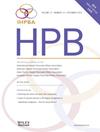Association of chemotherapy completion rates and overall survival with postoperative complications after pancreaticoduodenectomy for pancreatic ductal adenocarcinoma
IF 2.7
3区 医学
Q2 GASTROENTEROLOGY & HEPATOLOGY
引用次数: 0
Abstract
Introduction
Despite the benefits of surgical resection and adjuvant chemotherapy for pancreatic ductal adenocarcinoma (PDAC), over 30 % of patients fail to complete adjuvant oncological treatment. Whether postoperative complications affect chemotherapy completion rates and overall survival remains uncertain. We hypothesized that postoperative complications would be associated with chemotherapy delays, omission, and reduced overall survival (OS).
Methods
This was a retrospective analysis of patients undergoing pancreaticoduodenectomy for PDAC from 2008 to 2022 to assess whether serious surgical complications, defined as Clavien Dindo Grade 3b or higher, were associated with the omission or delay of adjuvant oncologic treatment as well as OS.
Results
A total of 920 patients were available for analysis. Pancreatic and bile leakage were associated with risk of chemotherapy omission (OR 1.97 [CI 95 % 1.25–3.12], p = 0.004 and OR 1.96 [CI 95 % 1.04–3.67], p = 0.032, respectively). No delay of adjuvant chemotherapy >90 days nor change in OS was found.
Conclusion
Major surgical complications influence the likelihood of omitting adjuvant chemotherapy but not delaying it > 90 days. Patients with pancreatic or bile leakage were at greater risk of not completing planned chemotherapy but had the same OS.

胰腺导管腺癌胰十二指肠切除术后化疗完成率和总生存率与术后并发症的关系。
简介:尽管手术切除和辅助化疗对胰腺导管腺癌(PDAC)有很大益处,但仍有超过 30% 的患者未能完成辅助肿瘤治疗。术后并发症是否会影响化疗完成率和总生存率仍不确定。我们假设术后并发症与化疗延迟、遗漏和总生存率(OS)降低有关:这是对2008年至2022年接受胰十二指肠切除术治疗PDAC的患者进行的一项回顾性分析,旨在评估严重手术并发症(定义为Clavien Dindo 3b级或以上)是否与肿瘤辅助治疗的遗漏或延迟以及OS有关:共有 920 名患者可供分析。胰漏和胆漏与放弃化疗的风险有关(OR 分别为 1.97 [CI 95 % 1.25-3.12],p = 0.004 和 OR 1.96 [CI 95 % 1.04-3.67],p = 0.032)。没有发现辅助化疗延迟超过90天或OS发生变化:结论:主要手术并发症会影响放弃辅助化疗的可能性,但不会影响延迟辅助化疗超过90天。胰漏或胆漏患者未完成计划化疗的风险更大,但其OS相同。
本文章由计算机程序翻译,如有差异,请以英文原文为准。
求助全文
约1分钟内获得全文
求助全文
来源期刊

Hpb
GASTROENTEROLOGY & HEPATOLOGY-SURGERY
CiteScore
5.60
自引率
3.40%
发文量
244
审稿时长
57 days
期刊介绍:
HPB is an international forum for clinical, scientific and educational communication.
Twelve issues a year bring the reader leading articles, expert reviews, original articles, images, editorials, and reader correspondence encompassing all aspects of benign and malignant hepatobiliary disease and its management. HPB features relevant aspects of clinical and translational research and practice.
Specific areas of interest include HPB diseases encountered globally by clinical practitioners in this specialist field of gastrointestinal surgery. The journal addresses the challenges faced in the management of cancer involving the liver, biliary system and pancreas. While surgical oncology represents a large part of HPB practice, submission of manuscripts relating to liver and pancreas transplantation, the treatment of benign conditions such as acute and chronic pancreatitis, and those relating to hepatobiliary infection and inflammation are also welcomed. There will be a focus on developing a multidisciplinary approach to diagnosis and treatment with endoscopic and laparoscopic approaches, radiological interventions and surgical techniques being strongly represented. HPB welcomes submission of manuscripts in all these areas and in scientific focused research that has clear clinical relevance to HPB surgical practice.
HPB aims to help its readers - surgeons, physicians, radiologists and basic scientists - to develop their knowledge and practice. HPB will be of interest to specialists involved in the management of hepatobiliary and pancreatic disease however will also inform those working in related fields.
Abstracted and Indexed in:
MEDLINE®
EMBASE
PubMed
Science Citation Index Expanded
Academic Search (EBSCO)
HPB is owned by the International Hepato-Pancreato-Biliary Association (IHPBA) and is also the official Journal of the American Hepato-Pancreato-Biliary Association (AHPBA), the Asian-Pacific Hepato Pancreatic Biliary Association (A-PHPBA) and the European-African Hepato-Pancreatic Biliary Association (E-AHPBA).
 求助内容:
求助内容: 应助结果提醒方式:
应助结果提醒方式:


